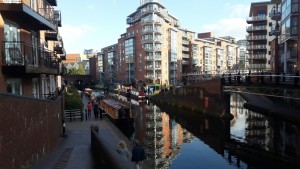16th February 2016 Skopje, North Macedonia
Not everything you learn is in university
Living as a student in the UK what mainly contributes for my satisfaction are opportunities that the university offers. However, the quality of higher education in the UK is not news. It is well known that some of the best universities in the world are here, and they not only provide students with first-class academic knowledge, but also enable them to improve their practical skills, think critically and enjoy their studies. The good thing of studying in the UK is not just enhancement of academic success, it is experiencing the everyday live in the country and learning from good practices.
Birmingham is the second biggest city in the UK and it is one of the biggest industrial cities in Britain. This may give you an impression that it is a crowded, dirty and polluted city, but this is not the case. Birmingham is a lovely city, with lots of parks, long canals and green areas. It is not a popular fact, but Birmingham has more canals than Venice. Although this is impressive, it didn’t surprise me. I was expecting good environment policies and public space suitable to citizen’s needs. What impressed me the most is the awareness and personal responsibility that people have for their environment.
Before I came here I thought of myself as a very environmentally responsible person. My main transport was a bike, never littered public spaces and tried to influence my surroundings as much as I could. However, when I came here I realized that I have a lot to improve in my ecological behaviour.
Simple everyday activities make the difference how we contribute to environment. Such everyday activities made me aware what actually environmentally responsible behaviour means.
The first time I went to buy detergent I couldn’t find the powder detergent I was using back home. I asked my British friend why local shops were not supplied with this detergent and she explained to me that it contained a substance that is harmful for the environment and therefore it was rarely used. Though I thought this was very responsible, my surprise came when I saw the prices in the big supermarkets. The detergent that was commonly used was more expensive than the one I was looking for. For me, that was the first time to see how everyday supply that was more expensive was at the same time more preferred, just because it was ecologically friendly.
Someone may argue not everyone could afford to pay more just to protect the environment, but is not all about the money. My flatmate was not familiar what is the proper procedure for recycling a can, and my reaction on that was ‘just throw it in the general waste’ to which she responded ‘if we all do that, in few years our country will be polluted.’ Instead of listening to my ‘advice’ she searched the page l of the public waste service and when she couldn’t find the information, she sent an email with her question. For me this was very unusual, she spent significant part of her time just to make the right action.
The last thing that made me aware for my irresponsibility to the environment was one conversation I had with vegetarian Ph.D. student in ecology. While discussing his reasons for being vegetarian I was completely surprised that his main reason was environment. As he explained, ‘I like meat, but this part of the world cannot afford to consume the current amount of meat and all I can do is try contribute for better balance.’
These situations made me aware that being an ecologically responsible person is not only declaring that environment is important. It is choosing eco-friendly actions even when they cost more, take more time, or require us to quit from some personal enjoyment. It is a fact that the UK has good environmental policies, but these policies wouldn’t matter if the citizens didn’t have the awareness for their own responsibility in the whole process of taking care for our environment.
Coming from a country that faces ecological problems and pollution I would love to see such responsible behaviour and at the same time policies that enable the citizens to protect their environment. Having the chance to upgrade the knowledge in your field and at the same time to learn from the everyday life in the UK is what makes the Chevening journey life-changing experience.
Monika Bozinoska, Chevening scholar
Regards from Birmingham

